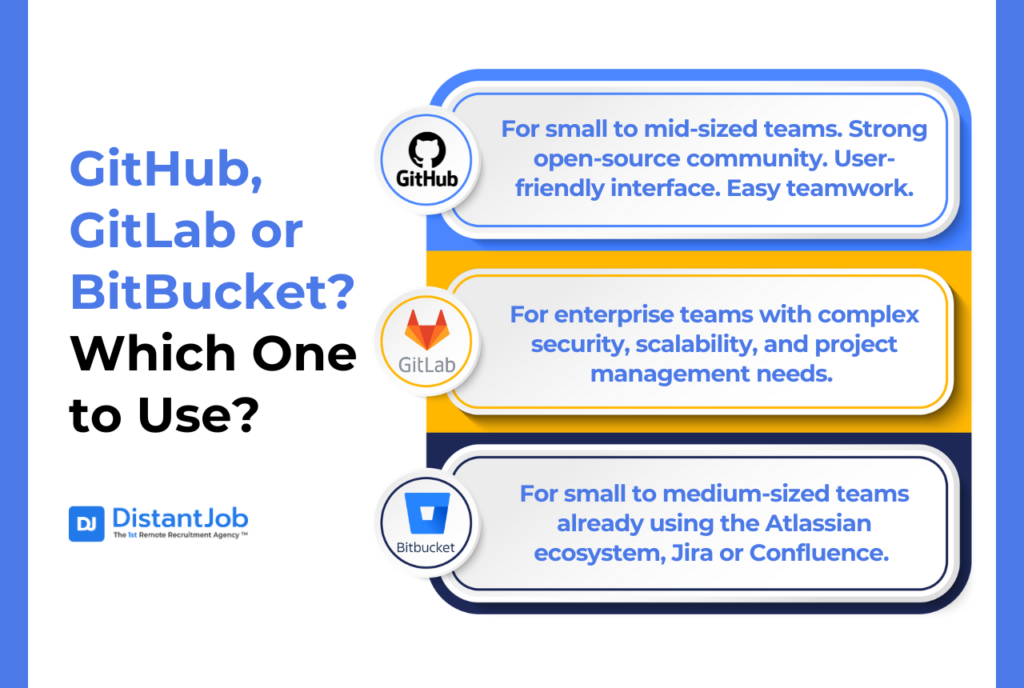When it comes to managing remote development projects effectively, choosing between GitHub vs GitLab vs BitBucket is more than a technical decision—it’s actually key to fostering great collaboration, achieving amazing results, and ensuring long-term success. These platforms, often called repository managers, have a key influence on making workflows smoother, letting people share code easily, and enabling version control. For remote teams, they are must-have tools that keep everyone up to speed and on the same page, all the while reducing the chance for errors.
With features like pull requests, issue tracking, two-step authentication, and repository cloning, these platforms make complex projects simpler and help remote teams work better. They also offer advanced options for scalability, automation, and integration with tools your team already uses, allowing them to do their best work no matter where they’re working from.
But, you might be asking yourself: “How to choose between GitHub, GitLab, and Bitbucket?” Look no further—in this article we’ll look at what makes each one special, what they’re good at, and where they fall short, helping you pick the platform that works best for your team.
What is Git?
By definition, Git is a ‘free and open-source distributed version control system designed to handle everything from small to extensive projects with speed and efficiency.’
Before Git was created, developers used to submit their scripts to central servers without keeping a copy of their code. As a result, developers couldn’t see if changes were made to their source code. And, more importantly, they had no chance to communicate with others.
In 2005, the first Git version control system was introduced to track changes in computer files and source code. In addition, the distributed version control tool allows dev teams to work together on several parallel branches. In short, it makes possible an interactive collaboration between developers working in distributed teams.
Here are the core Git’s features:
- History track
- Free and open source
- Non-linear development and virtual collaboration
- Backups building
- Scalable applications
- Easier Branching
Services using Git can support your offshore development team while creating and running software projects for your company. Let’s have a look at the three most popular ones and which one is best for your business:
GitHub
Since its launch in 2008, GitHub has been the most extensive code hosting service. Known for its robust community and open-source contributions, GitHub is particularly well-suited for developers seeking a community-driven environment. It enables developers to store and manage code with powerful version control features, making collaboration and project tracking seamless. Key functionalities like repository branching, pull/merge requests, and codebase cloning make the development process simpler, while features such as wiki support and immediate contributor notifications boost team efficiency.
Key Features and Strengths of GitHub
User Interface and Usability
GitHub stands out for its sleek and easy-to-use interface. Features like GitHub Pages let developers host static websites, while GitHub Gists help share code snippets efficiently. The platform makes project management straightforward even for teams working from different locations. Developers can upload files, link commits to team members, and handle repositories without hassle.
Version Control and Collaboration
GitHub shines in version control and teamwork. Branch management, pull requests, and code reviews help teams track changes, add feedback, and keep code top-notch. Developers can use history tracking to look at past commits and keep a clear record of how the project has grown.
Marketplace and Integrations
The GitHub Marketplace has a selection of tools to boost its features ranging from project management aids to services that automate tasks. GitHub Actions make CI/CD workflows smoother, while connections with Asana, AWS, Google Cloud, and Windows Azure improve compatibility across platforms.
Security and Compliance
GitHub puts security first with features like Dependabot to update dependencies automatically, Security Advisories to handle vulnerabilities, and alerts in real-time to tackle issues quickly. These safeguards make GitHub a trustworthy choice for teams that need tight security.
AI-Powered Developer Tools
GitHub Copilot, powered by OpenAI, has an influence on developer productivity in a big way. This AI-based tool offers code snippet suggestions, speeds up coding processes, and works with many coding languages. New developments like GitHub Next keep adding to what the platform can do showing how AI can change software creation.
Community and Open Source Contributions
As a center for open-source projects, GitHub has one of the biggest developer communities worldwide. Its lively open-source setting helps new ideas grow, teamwork happen, and learning take place. Public code stores give projects visibility, while community resources and discussion boards give strong help to coders at all skill levels.
GitHub’s Limitations
1. Offers Limited Support for Non-Developers
GitHub’s platform has developers as its main focus making it harder for non-technical people to use. Project managers and designers might struggle to navigate or use GitHub’s features without extra help or training.
2. There Are Some Concerns about Microsoft Ownership
Microsoft’s purchase of GitHub has raised worries among some open-source supporters. They’re concerned about possible conflicts of interest keeping data private, and getting stuck with one vendor. Even though Microsoft backs open-source projects, some users still have doubts.
3. Its Cost and Feature Limits for Bigger Teams
GitHub offers free and team plans that work well for smaller groups. However, enterprise features like better security, audit tools, and higher caps come with big price tags. This can make GitHub less appealing to companies watching their budget or running large operations.
Choosing GitHub: When It Makes Sense
GitHub stands out as a top pick for small to mid-sized teams that appreciate a strong open-source community, a user-friendly interface, and tools that make teamwork easy. It’s perfect for projects that need to be seen and welcome community input, like open-source work or public code storage.
Teams that use AI tools such as GitHub Copilot or need to connect with popular project management systems will also find value in GitHub’s wide-ranging ecosystem.
Ultimately, if your team cares most about ease of use and lots of ways to connect with other tools, GitHub provides a dependable and adaptable answer.
GitLab
GitLab is a comprehensive DevSecOps platform that caters to small dev teams and big corporations alike. It’s well-known for its wide-ranging toolkit allowing teams to handle the whole software dev cycle from one place. GitLab’s solid CI/CD tools, broad security features, and options for self-hosting make it a top pick for companies that value security, growth potential, and cutting-edge automation.
Key Features and Strengths of GitLab
User Experience and Ease of Use
GitLab’s interface makes it easy to navigate complex workflows. The Web IDE lets developers write, commit, and debug code on the platform. Group-level management helps oversee projects well. Teams can use built-in tools and dashboards to organize tasks and focus on what matters.
Complete DevOps and DevSecOps Tools
GitLab offers full DevOps support from start to finish. Teams can use GitLab’s CI/CD pipelines to automate testing, delivery, and monitoring. This covers everything from managing source code to deployment. Features like Kubernetes integration and container scanning make workflows for modern cloud apps run . This ensures high performance and security.
Advanced Security and Compliance
Security stands at the heart of GitLab’s priorities. Tools like Static and Dynamic Application Security Testing (SAST/DAST), dependency scanning, and secret detection help spot weaknesses as developers work. Role-based permissions and audit logs ensure teams meet industry standards making GitLab a top choice for groups working with sensitive information.
Self-Hosting and Customization
GitLab’s open-source roots let teams host it themselves and tailor their setup to match specific company needs. This adaptability proves useful for big businesses with strict privacy or regulatory demands. GitLab’s lively community also offers a ton of custom plugins and integrations to boost its capabilities.
Collaboration and Project Management
GitLab’s design puts teamwork front and center. Its features help teams talk to each other and solve problems effectively. These include:
- Threaded discussions
- Merge request approvals
- Built-in issue tracking
Teams can also plan and keep tabs on multiple projects using:
- Labels
- Milestones
- Boards
GitLab’s Limitations
1. It’s Tougher to Learn
GitLab’s full set of DevOps and security tools can be too much for new users who don’t know much about complex CI/CD pipelines or built-in DevSecOps processes. The wide range of features might mean teams switching from simpler platforms need more time to train or get used to the system.
2. Does Not as Many Community Add-ons
GitLab does a great job with its own features, but it doesn’t have as many third-party add-ons in its marketplace as GitHub does. This could limit teams that depend on certain outside tools or plugins to do their work.
Choosing GitLab: When It Makes Sense
GitLab stands out as the top choice for enterprise teams with complex security, scalability, and project management needs. Its strong CI/CD pipelines ability to self-host, and built-in security features make it perfect for companies that handle sensitive data or need to comply with regulations.
Also, teams that manage big projects with different workflows will like GitLab’s advanced automation tools and role-based teamwork features.
Bitbucket
Bitbucket, a part of Atlassian’s lineup, manages Git repositories. Teams that use Jira, Confluence, and other Atlassian tools find it fits their needs well. It works with these products making it a good pick for groups that depend on Atlassian’s tools to manage projects and work together. Besides, Bitbucket offers built-in CI/CD pipelines and strong access controls, which help teams work faster and more securely.
Key Features and Strengths of BitBucket
How It Looks and Works
Bitbucket’s interface is easy to use and works well with other Atlassian tools. The platform has project navigation features that let you switch between repositories without hassle. Its simple UI helps teams work together better. Developers can use pull requests, branch permissions, and inline comments to make code reviews and approvals smoother.
Works Great with Other Atlassian Tools
Bitbucket shines in how it connects with Jira and Confluence. Teams can link commits, branches, and pull requests straight to Jira issues creating a smooth workflow. Confluence integration means you can add docs making Bitbucket a top choice for software teams who want to collaborate.
CI/CD with Bitbucket Pipelines
Bitbucket Pipelines, the built-in CI/CD tool in Bitbucket, makes continuous integration and deployment easier. Teams can set up pipelines right in their code repositories using YAML config files. This allows automatic builds, tests, and deployments. Small teams looking for a CI/CD solution that’s easy to set up will find this feature helpful.
Security and Access Controls
Bitbucket has strong security measures in place. These include branch permissions, two-factor authentication, and IP whitelisting. These features make sure only team members with permission can access sensitive code. This cuts down the chance of unauthorized changes or data leaks.
Cost-Effective for Small Teams
Bitbucket’s pricing structure works well for small teams. It offers free private repositories and tiered pricing options giving startups and small businesses an affordable way to manage their code without spending too much.
BitBucket’s Limitations
1. It Has Few Extensions and a Small Marketplace
Bitbucket doesn’t offer as many third-party add-ons and extensions as GitHub and GitLab do. This means it’s less flexible for teams that depend on a wide range of tools to boost their productivity and teamwork.
2. Its Basic Feature Set Is Not The Best for Large Teams
Bitbucket works well for small to medium teams, but it might not meet the needs of large or complex setups. It offers fewer advanced features like in-depth security measures and extensive CI/CD capabilities than its competitors.
Choosing BitBucket: When It Makes Sense
Bitbucket suits small to medium-sized teams already using the Atlassian ecosystem. Teams using Jira for project management or Confluence for documentation benefit from its native integrations, which make workflows easier.
Bitbucket provides a cheap and easy-to-use solution for simple development projects that don’t need advanced customization or features.
Consider These Features To Help You Choose The Right Git Platform

When you’re trying to choose between GitHub, GitLab, and Bitbucket, you need to focus on the features that’ll make your team thrive. Each platform has its strong points, and getting a grip on these can help you pick the right one.
If your team depends on automation and CI/CD, GitLab stands out with its built-in tools that make every step of the development lifecycle smoother. It provides CI/CD pipelines that aim to cut down time and reduce the need for manual work. GitHub Actions is another strong option letting developers create their own workflows and automate tasks well. On the other hand, Bitbucket Pipelines suits smaller teams or those who work within the Atlassian ecosystem offering easy-to-use CI/CD features that focus on simplicity.
AI tools are causing a revolution in how developers work, and GitHub Copilot is at the forefront with its AI-powered coding assistant. It has the ability to suggest code snippets, make repetitive tasks automatic, and boost workflow speed. Despite being newer, GitLab Duo is making progress in AI-driven DevOps providing tools that help teams to improve their processes and workflows.
How well a tool works with project management software is another big thing to think about. GitHub works well with platforms like Asana, Trello, and Jira, which helps keep tasks organized and tracked. Bitbucket is the top pick for teams already using Atlassian products like Jira and Confluence, because it connects so with them. GitLab doesn’t focus as much on working with other companies’ tools, but it makes up for this with its own strong project management features.
For teams that want to work together and review code, all three platforms have strong tools to offer. GitHub stands out because it has an easy-to-use pull request system and lets people comment in real time, which makes it simple for teams spread out in different places to work together. GitLab goes even further by adding task management and permissions based on roles right into merge requests. Bitbucket, while more basic, still gives teams reliable features for working together that work well for smaller groups.
Many companies put safety first, and GitLab stands out with its cutting-edge tools such as static and dynamic application security testing (SAST/DAST) and checks for risky dependencies. GitHub keeps things safe too using Dependabot and instant warnings about weak spots. Bitbucket is secure but might fall short on high-end features, which makes it a poor fit for fields that need to follow strict rules.
If you want to host your own system, GitLab is the clear choice. It gives you tons of options to host yourself letting you take full charge and make it your own. GitHub has a business plan they run for you, while Bitbucket doesn’t give you as much room to change things up.
Cost plays a big role in choosing a platform. GitHub has good free plans but asks for money for advanced features for bigger teams. GitLab gives a lot for free but can cost more for large companies. Bitbucket is often the cheapest choice for small groups already using Atlassian tools.
Last of all, community backing matters a lot. GitHub has the biggest and most lively developer crowd giving users a huge network to get help from. GitLab has a smaller but devoted user base with strong resources. Bitbucket puts more focus on private projects and company use, so its public community isn’t as active.
By comparing these features to what your team needs, you can pick the platform that suits your workflow and goals. Whether it’s GitHub’s teamwork-friendly ecosystem, GitLab’s business-level features, or Bitbucket’s connection to Atlassian tools, each has its own strengths to push your development projects ahead.
Github vs Gitlab vs Bitbucket: A Comparison For Remote Teams
After this overview of each repository management service, we can analyze which one is the best for your project:
First, let’s talk about Bitbucket. Unless you want to integrate many Atlassian products with your version control repository, you should look at GitHub or GitLab. Bitbucket and GitLab have a similar price range, but the first has mixed reviews about its UI. Some users say it’s very unintuitive. On the flip side, others claim they love the layout and can access and manage all projects, whether personal or professional, from one screen.
Generally speaking, the main advantage of BitBucket is the simplicity of the project management. Both business owners and project managers save time viewing repository files directly in Jira. Also, BitBucket makes good use of Jira features, including reporting and communication. For teams already leveraging Atlassian tools, Bitbucket is a seamless fit that optimizes project workflows.
Second, let’s take a look at the most popular option, GitHub. Probably most developers already know it. For remote teams, features like sharing code snippets (called Gists in GitHub), editing files directly from the browser, powerful searching, or LDAP and JIRA integration make this platform the best option. GitHub Actions also streamline CI/CD pipelines, giving it an edge in automation. Plus, it provides Syntax highlighting – which isn’t present in BitBucket despite its more versatile functionality. GitHub is especially suited for teams that value community-driven development, extensive integrations, and AI-powered tools like Copilot.
Third, GitLab is a great option and has almost the same features as GitHub. However, the latter charges for private repositories, and BitBucket is restricted to 5 users. Unlike these two, GitLab offers free private repositories. For example, working with Digital Ocean, GitLab is the most efficient solution to host 1,000 repositories and 100 distributed team members. As open-source, it provides integrations and features written by other developers, speeding up the development process. Finally, you can install almost any combination of hardware, OS, and CM, including cloud providers, virtual machines (VMs), onto a server directly, and more. GitLab is the best choice for teams prioritizing security, scalability, and the ability to self-host while managing complex workflows.
To sum up:
- When it comes to organizing remote teams, BitBucket is the most recommended if you use or plan to use Atlassian products like Jira.
- For teams with a good budget and the comfort of a popular platform, GitHub is the one, offering extensive integrations and community support.
- And when budget is a concern, GitLab gives you excellent functionality with affordable plans, combined with powerful security features and scalability options.
Side-by-Side Comparison: GitHub vs GitLab vs Bitbucket
To help you make your final choice, we’ve put together all the key info you need. This table breaks down what each platform provides, from main features and CI/CD abilities to cost options and ways to connect with other tools. This makes it simpler for you to pick the one that suits your dev team’s needs best.
| Category | GitHub | GitLab | Bitbucket |
| Core Features | – Unlimited private/public repositories in free plans.- Robust collaboration tools like pull requests, branching, and forking.- Advanced AI tools (Copilot). | – End-to-end DevOps platform.- Free tier with extensive functionality, including private repositories.- Role-based permissions. | – Seamless integration with Atlassian tools (Jira, Confluence).- Unlimited repositories in free plans.- Supports Mercurial (legacy feature). |
| CI/CD Capabilities | – GitHub Actions for workflow automation.- 2,000 CI/CD minutes/month on free plans; more with paid tiers. | – Industry-leading CI/CD tools with extensive pipeline customization.- 400 compute minutes in free tier; scales to 50,000 in premium plans. | – Bitbucket Pipelines with CI/CD workflows.- 50 build minutes/month in free plans; up to 3,500 with premium plans. |
| Integration Options | – Integrates with Asana, AWS, Azure, Google Cloud, and Slack.- Extensive GitHub Marketplace for third-party tools. | – Native integrations for Kubernetes, Terraform, and monitoring tools.- Open-source nature allows for custom integrations. | – Best suited for teams using Jira and Confluence.- Limited marketplace compared to GitHub and GitLab. |
| Security and Compliance | – Features like Dependabot, Security Advisories, and vulnerability scanning.- Compliance certifications (SOC, ISO). | – Advanced security scanning: SAST, DAST, Dependency Scanning, and Container Scanning.- Ideal for highly regulated industries. | – Two-step verification and encryption features.- Requires Atlassian Guard subscription for advanced security options like IP allowlisting. |
| Community and Support | – Largest open-source community.- Extensive documentation, forums, and GitHub Discussions. | – Strong open-source and enterprise community.- Detailed documentation and DevSecOps-focused resources. | – Focused on smaller teams in the Atlassian ecosystem.- Community support available in free plans; premium plans offer SLA-backed support. |
| Customization & Extensibility | – Custom workflows through GitHub Actions and integrations. | – Fully customizable DevOps workflows.- Self-hosted or cloud options available. | – Designed for seamless Atlassian ecosystem customization but fewer third-party integrations compared to GitHub and GitLab. |
| Pricing Plans | – Free Tier: Unlimited repositories, 2,000 CI/CD minutes/month.- Team Plan: $4/user/month.- Enterprise Plan: $21/user/month with advanced features. | – Free Tier: 400 compute minutes/month, 5 users per top-level group.- Premium Plan: $29/user/month with advanced CI/CD and security tools.- Ultimate Plan: $99/user/month for enterprise-level DevSecOps. | – Free Tier: Unlimited repositories, 50 CI/CD minutes/month.- Standard Plan: $3.30/user/month.- Premium Plan: $6.60/user/month for enhanced capabilities. |
Bottom line
Picking the right Git platform—GitHub, GitLab, or Bitbucket—can make or break your development projects. GitHub works great for open-source teamwork and groups looking for AI-powered tools and smooth integrations. GitLab shines for big companies that care about security, growth potential, and DevOps processes, while Bitbucket fits with teams already using Atlassian tools like Jira.
Here’s the trick: match your pick with what your team needs. Go for GitHub if you want community help and add-ons, GitLab if you need top-notch CI/CD and security, or Bitbucket to keep tabs on projects efficiently. Focus on tools that will make your work smoother such as AI-powered coding tools, DevSecOps capabilities, or smooth Jira integration.
Along with the right platform, you need the right Git developers. And that’s where we come in. We can help you create a remote team of Git-proficient developers who will hit the ground running. Our tailored hiring solutions can save you time and make sure your team is ready to succeed in a remote-first, teamwork-focused setting. Get in touch with us now to boost your company’s productivity and spark new ideas.





